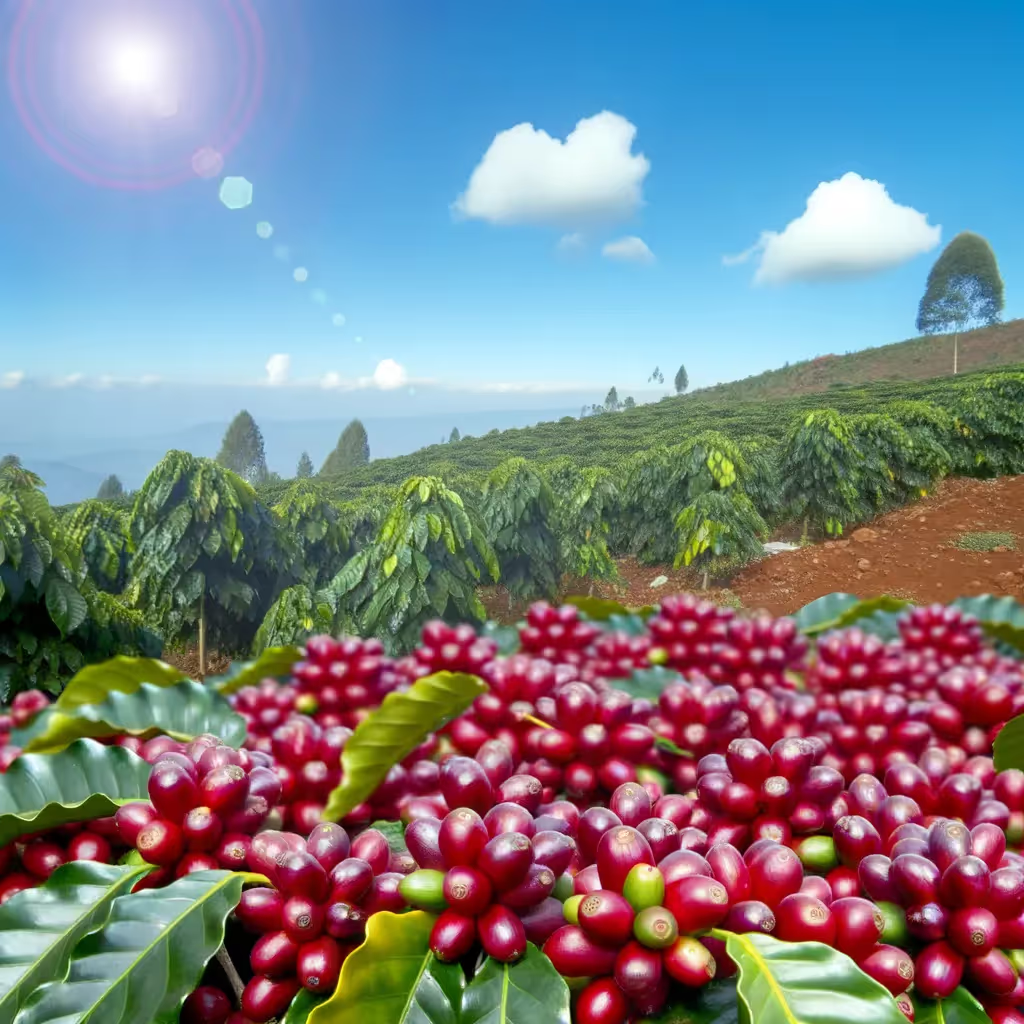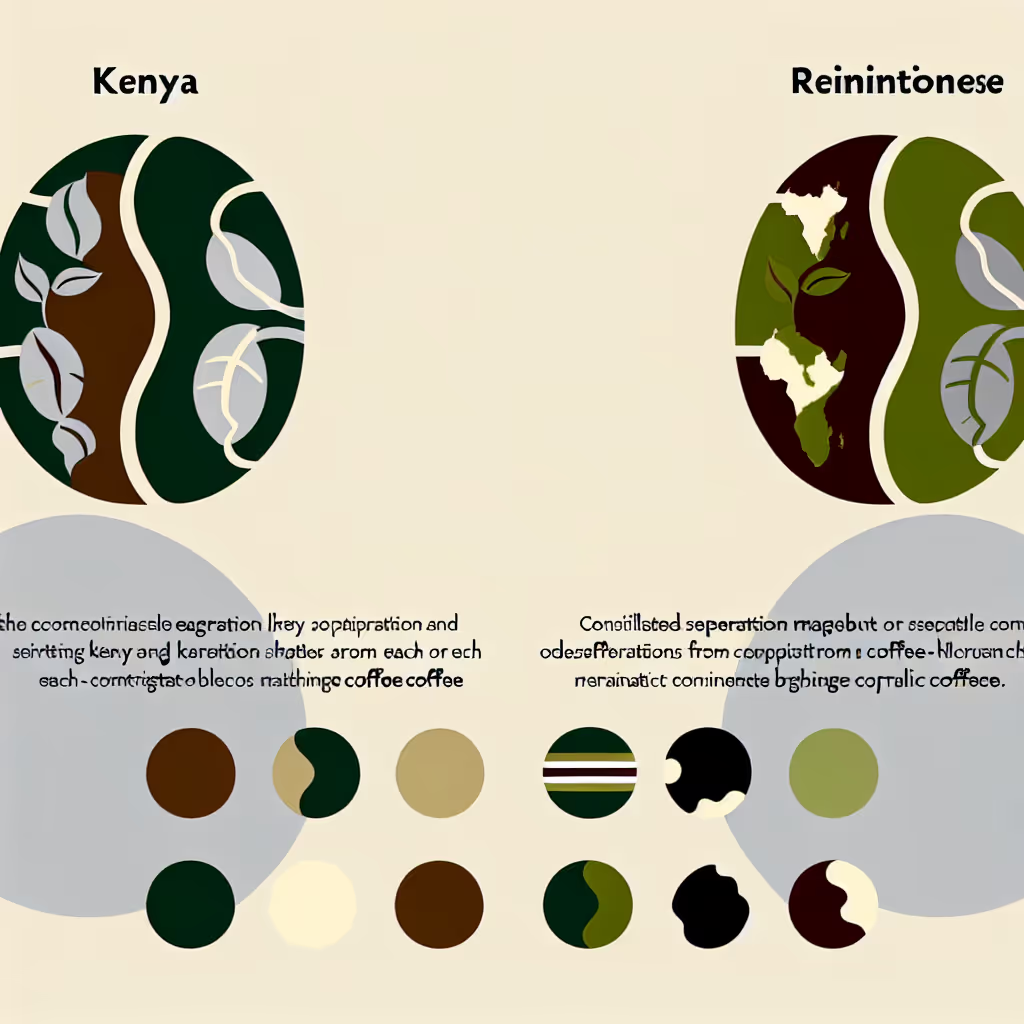Kenyan Vs. Rwandan Coffee
This comparison explores the distinct qualities of Kenyan and Rwandan coffees, examining their flavor profiles, growing conditions, and processing methods to help coffee enthusiasts make informed choices.

Brief Description
Kenyan coffee is renowned for its bright acidity, full body, and complex flavor profile. Grown in the rich volcanic soils of the Central Highlands, these beans benefit from ideal climate conditions and meticulous processing. The result is a cup that's bold, wine-like, and often described as the 'connoisseur's choice'. With notes ranging from blackcurrant to citrus, Kenyan coffee offers a truly unique and memorable tasting experience.
Rwandan coffee is a hidden gem in the specialty coffee world, known for its bright acidity, complex flavors, and clean cup profile. Grown in the high-altitude regions of this small East African nation, Rwandan coffee benefits from rich volcanic soils and ideal growing conditions. The country's tumultuous history has given way to a thriving coffee industry, with smallholder farmers producing some of the most sought-after beans in Africa. Rwandan coffee is characterized by its tea-like body, citrus notes, and often floral or fruity undertones, making it a favorite among coffee enthusiasts seeking unique and vibrant flavors.
Importance of Comparison
Comparing Kenyan and Rwandan coffees is crucial for coffee lovers seeking to explore the diverse flavors of East African beans. Both origins offer unique taste experiences, reflecting their specific terroir and processing techniques. Understanding these differences helps consumers expand their palate, make informed purchasing decisions, and appreciate the nuances of specialty coffee from this region.
Key Attributes
Origin
Kenyan
Rwandan


Consumer Guide
When choosing between Kenyan and Rwandan coffee, consider your flavor preferences. Kenyan coffee is known for its bold, wine-like acidity with blackcurrant and citrus notes, ideal for those who enjoy a bright, complex cup. Rwandan coffee offers a cleaner, tea-like body with citrus, floral, and red berry notes, perfect for those seeking a more delicate flavor profile. Both origins excel in pour-over and French press brewing methods, allowing their unique characteristics to shine. Consider trying both as single-origin brews to fully appreciate their distinct flavors before deciding which best suits your taste.
Expert Opinions
Coffee expert James Hoffmann notes, 'Kenyan coffees are often the pinnacle of brightness and complexity, while Rwandan coffees offer a more subtle, yet equally intriguing flavor profile.' Barista champion Lem Butler adds, 'The double fermentation process used in Kenya contributes to its distinctive flavor, while Rwanda's diverse processing methods result in a wider range of flavor possibilities within a single origin.'
FAQs
Kenyan coffee is known for its bold, wine-like acidity with prominent blackcurrant and citrus notes, while Rwandan coffee offers a cleaner, tea-like body with citrus, floral, and red berry flavors. Kenyan coffee tends to be more intense and complex, while Rwandan coffee is often described as more delicate and nuanced.
Both countries have high-altitude growing regions with rich volcanic soils. Kenyan coffee is typically grown at slightly higher elevations (1400-2100m) compared to Rwandan coffee (1200-2000m). This difference in altitude can contribute to variations in acidity and flavor complexity between the two origins.
Kenyan coffee is primarily processed using the washed method, often with a unique double fermentation process that contributes to its distinctive flavor. Rwandan coffee is more diverse in its processing, with washed, natural, and honey processes all being used. This variety in processing methods allows for a wider range of flavor profiles within Rwandan coffee.
Both Kenyan and Rwandan coffees excel in pour-over, French press, and cold brew methods. These brewing techniques allow the unique characteristics of each origin to shine. Pour-over methods are particularly popular for highlighting the bright acidity and complex flavors of both origins.
Kenya produces significantly more coffee annually, with about 50,000 metric tons compared to Rwanda's 16,000 metric tons. This difference in production volume can affect availability and pricing, with Kenyan coffee often being more widely available in the specialty coffee market.
While both origins can be used for espresso, Kenyan coffee's bold flavors and high acidity can create a more intense and complex espresso shot. Rwandan coffee, with its cleaner and more delicate profile, may be better suited for milk-based espresso drinks where its subtle flavors can still shine through.
Conclusion
Both Kenyan and Rwandan coffees offer exceptional quality and unique flavor profiles that showcase the best of East African coffee production. Kenyan coffee stands out for its bold, complex flavors and bright acidity, making it a favorite among those who enjoy an intense, wine-like cup. Rwandan coffee, with its cleaner, more delicate profile, appeals to those seeking a nuanced and versatile brew. Ultimately, the choice between these two origins comes down to personal preference and the specific flavor experience you're seeking. We recommend trying both to fully appreciate the diverse and exciting world of East African coffee.






